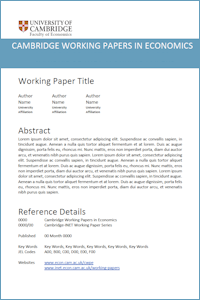
Jochmans, K.
Testing Random Assignment to Peer Groups
CWPE2024
Abstract: Identification of peer effects is complicated by the fact that the individuals under study may self-select their peers. Random assignment to peer groups has proven useful to sidestep such a concern. In the absence of a formal randomization mechanism it needs to be argued that assignment is `as good as' random. This paper introduces a simple yet powerful test to do so. We provide theoretical results for this test and explain why it dominates existing alternatives. Asymptotic power calculations and an analysis of the assignment mechanism of players to playing partners in tournaments of the Professional Golfer's Association are used to illustrate these claims. Our approach can equally be used to test for the presence of peer effects. To illustrate this we test for the presence of peer effects in the classroom using kindergarten data collected within Project STAR. We find no evidence of peer effects once we control for classroom fixed effects and a set of student characteristics.
Keywords: asymptotic power, bias, peer effects, random assignment
JEL Codes: C12 C21
Author links:
PDF: https://www.econ.cam.ac.uk/research-files/repec/cam/pdf/cwpe2024.pdf 
Open Access Link: https://doi.org/10.17863/CAM.52478
